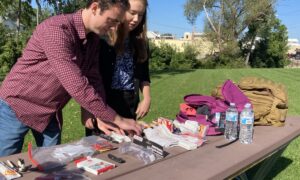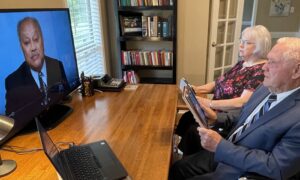‘Going green’
Who are the witnesses?
About 8 million Jehovah’s Witnesses worldwide
1.2 million Jehovah’s Witnesses in United States
The Watch Tower Bible and Tract Society of Pennsylvania is the nonprofit corporation formed in 1884 under the laws of the Commonwealth of Pennsylvania. It is used by Jehovah’s Witnesses to support their worldwide work, which includes publishing bibles and bible-based literature.
Basic beliefs:
The Bible: All Scripture is inspired of God.Â
The Creator: The true God has given himself a personal name—Jehovah—that distinguishes him from false gods
Jesus Christ: He is the Savior, “the Son of God,†and “the firstborn of all creation.â€Â
God’s Kingdom: There is a heavenly government with a King—Jesus Christ—and 144,000 corulers, who are “bought from the earth.†They will rule over the earth, which will be cleansed of all wickedness and will be inhabited by many millions of God-fearing humans.
Bible prophecy: What God foretells always comes true, including the Bible prophecies concerning the end of the present world.
Preaching: It is an honor to share “the good news of the kingdom.†Whether people listen or not is their own choice.Â
Secular authorities: Obey the laws of the land when these do not conflict with God’s laws.
Source: jw.org
Why Warwick?
The main features that drew the Watch Tower Society to the Warwick property were its size and location, according to Devine. The property is 253 acres but only between 40 and 50 acres were used to build.Â
It’s not too far from the city, so there’s easy access for intrastate and international visitors. It’s also in a scenic location near a lake, creating an aspect of privacy, Devine said, with shopping for the residents still close by.Â
Traffic to and from the site will be minimal, since residents work on site, except for visitors, which Devine said they expect to have quite a few.Â
Another important component is that there’s a lot of local congregations of Jehovah’s Witnesses in Northern New Jersey and Southern New York.
“All of our staff support local congregations of Jehovah’s Witnesses,†Devine said. “So they’ll travel quite a distance actually to worship with our neighbors. I go to a congregation up here in Monroe. But right here is kind of an ideal location because you have Northern Jersey with all the suburbs and we have many congregations nearby, so it just works out really well.â€
With the group beginning to move out of Brooklyn, the Jehovah’s Witnesses sold their longest-held building in Brooklyn, 124 Columbia Heights, with its iconic tower atop the roof, for $105 million in April, according to the Brooklyn Daily Eagle. And according to the New York Post, the 733,000-square-foot world headquarters at 25-30 Columbia Heights and the 1.1-million square-foot as-of-right development site at 85 Jay St. were sold for $700 million.Â
These were among the 16 properties the organization owned in Brooklyn, which will all eventually be sold. The Watch Tower Bible and Tract Society also has a
location in the Ulster County hamlet of Wallkill, where many of their printing services are located. This large complex includes residence buildings as well.Â
 Neighbors
Even though the Watch Tower Society is a tax-exempt organization, Devine said, “We try to be good neighbors.â€
And the response from the community has been positive, Devine said.Â
“I think everybody was wondering who are these people and how can you build something like this using volunteers,†Devine said. “And I think everyone, including the building department, was skeptical. But we’ve won them over and the quality of the work, I feel, is very, very high.â€
According to Warwick Town Supervisor Michael Sweeton, the group has been exceptional throughout the whole planning and building process.Â
“They did everything the planning board asked them to do, they have been exemplary really in their construction activities,†Sweeton said. “We’ve had a monitor on site pretty much the entire time and our building inspector also visits a couple times a week. And everything that we’ve ever asked or wanted, they’ve done.â€
The Witnesses have also helped with certain public facilities in town. When Warwick needed some material to build one of last sports fields out at Union Corners Park, Sweeton said he contacted the Watch Tower Society.
The group responded by providing all of the material the town needed as well as hydroseeding the soil, which allowed the grass to come in very nicely and much more quickly than had the town done the work – all at no cost to taxpayers.Â
Devine said that the group also has built a press box at the Little League field near the headquarters.
There are also basketball courts and picnic pavilions being built on the property because part of the group’s agreement with the town was to have on site recreation, helping to avoid overloading the town’s’ parks with additional residents.Â
Currently, the Watch Tower Society is working with a Greenwood Lake Boy Scout Troop to refurbish the east shore of Greenwood Lake, offering their assistance in terms of material and volunteer trade help.
As far as impact on the town economically, Sweeton said that because the site itself was tax-exempt already, tax-wise, the headquarters won’t have a huge impact on the town.Â
The Watch Tower Society also is providing some on site medical services and have made arrangements with the Greenwood Lake Fire District; it is also working with the Tuxedo Fire District.Â
If any of the Headquarters residents decide to move off site to have children, they then would pay taxes and their children would likely go to the Tuxedo school district.Â
“The town has been great to deal with,†Devine said. “They’ve been very open and honest with us, we’ve tried to be open and honest with them, and I think we’ve got a great relationship.â€Â
As soon as the facility is completely done and the bible museum, which will be part of the headquarters, is finished, Devine said they will begin giving free tours to visitors, probably next spring. The bible museum will feature a first edition King James Bible printed in 1611.





